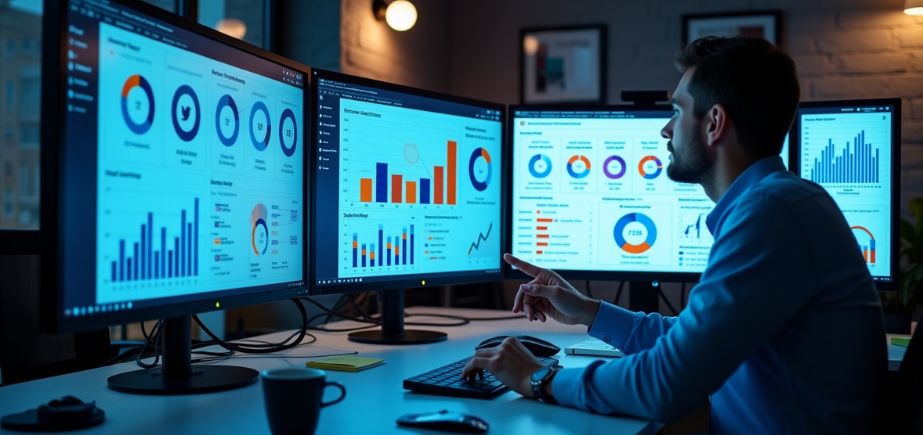Social media analytics tools are a necessity for marketers, agencies, creators, and companies that need monitoring, measurement, and optimization of their social media performance. They assist in the measurement of engagement rates, demographics of the audience, brand perception, and competitive activity across platforms. With real-time insights and AI-driven recommendations, they aid businesses in maximizing their content strategy, engagement rates, and generating maximum ROI.
The tools are chosen based on a top list that establishes the parameters such as data precision, available integrations for platforms, user interface, automation, reporting functionality, and competition overview. If you are a sentiment tracker brand as a customer, campaign optimizer, marketer, or engagement tracker influencer, there are practical insights within these tools that can be leveraged to seal your social game.
Criteria to Select the Ideal Social Media Analytics Tools
The choice of the best social media analytics tools is driven by required attributes that enable organizations, marketers, and content publishers to track and optimize their performance across social media. The most important selection criteria used to identify the best tools include:
- Platform Coverage: The tool must be capable of covering social media platforms such as Facebook, Instagram, Twitter, LinkedIn, TikTok, and YouTube.
- User Experience: An interactive dashboard and refined look make it user-friendly for both novices and experts.
- Real-time Data & Insights: Real-time tracking of engagement, reach, impressions, and sentiments is crucial in making timely business decisions.
- Sentiment Analysis & Social Listening: Machine learning tools that track brand mentions and emotions of consumers enable organizations to quantify the audience’s impression.
- Competitor Benchmarking: Capability benchmarking enables comparison with competitors to drive strategy improvement.
- Automated & Customizable Reports: Automated reports with adjustable metrics improve data presentation and time-saving.
- Integration Features: Integration with other marketing software, CRM tools, and analytics software improves workflow efficiency.
- AI & Predictive Analytics: Premium AI-driven recommendations enable enterprises to improve content and engagement strategies.
- Price & Scalability: Scalable and modular price solutions that are suitable for all business sizes, from small startups to large companies, are cheaper.
- Support & Training: Seamless customer support, tutorials, and training websites enable users to get the most out of the tool.
With these metrics set, companies will be in a position to select the appropriate social media monitoring software to monitor performance, analyze returns on investment, and refine their overall digital marketing strategy.
List of Top 15 Social Media Analytics Tools
1. Hootsuite Analytics
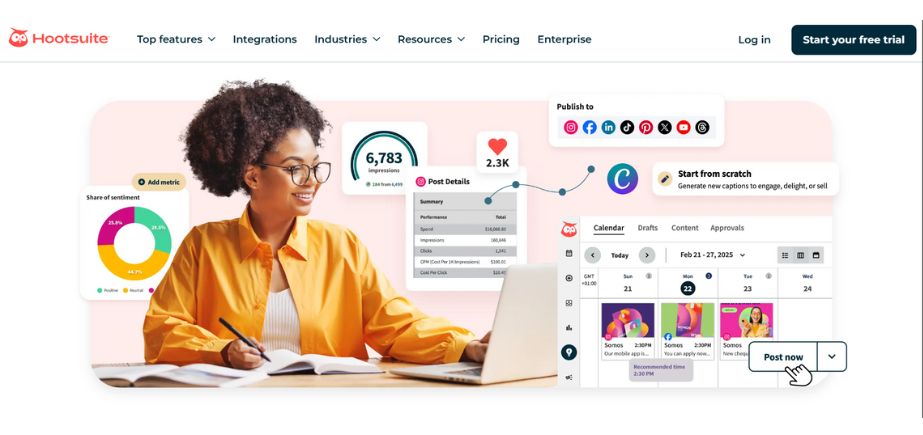
Social media performance tracking through Hootsuite Analytics allows enterprises to use its advanced application for multiple platform monitoring. Customers receive detailed reports regarding engagement activities and reach results, as well as follower acquisition patterns. Users obtain the ability to write customized reports while they schedule messages and stay updated in real time.
Joining Hootsuite enables businesses to interact with large social networking services, including Facebook, Twitter, Instagram, LinkedIn, and YouTube. The tool allows businesses to use competitive benchmarking, which shows how their performances stack up against competitors in their industry. Hootsuite Analytics uses AI suggestions along with automated report generation to benefit companies working on social media strategy development and wanting better return on investment results.
Key Features:
- Cross-platform analytics for multiple social accounts.
- Customizable reports with real-time data.
- Best time-to-post recommendations.
- Team collaboration and approval workflows.
Pros:
- Easy-to-use dashboard with detailed insights.
- Supports multiple social networks.
Cons:
- Expensive for small businesses.
- Limited advanced analytics in lower-tier plans.
Pricing: Starts at Starts at ₹1,915 per month
Who Should Use It?
Social media managers and marketing teams handle multiple accounts.
2. Sprout Social

Through Sprout Social, users gain detailed social media analytics, which help them monitor their business activities across multiple platforms. The analytic tool displays current engagement statistics as well as the audience breakdown and performance indicators versus competitors. Biased sentiment evaluation capabilities from the tool let brands measure customer sentiments.
Users of Sprout Social generate specific reports that deliver meaningful insights using their analytics tools. Smart Inbox is a Sprout Social feature that integrates multiple platform messages into one unified management system. Agencies and brands that want improved engagement alongside better content strategy selection should choose Sprout Social due to its advanced analysis features and automatic capabilities.
Key Features:
- AI-driven insights and sentiment analysis.
- Custom reporting with engagement tracking.
- Competitor benchmarking.
- Social listening for trend identification.
Pros:
- Comprehensive analytics and reporting.
- Strong integration with CRM tools.
Cons:
- Expensive for small businesses.
- Limited features in basic plans.
Pricing: Starts at $249/month.
Who Should Use It?
Mid-to-large businesses and agencies need detailed social media insights.
Suggested read: TikTok Analytics Tools
3. Buffer Analyze
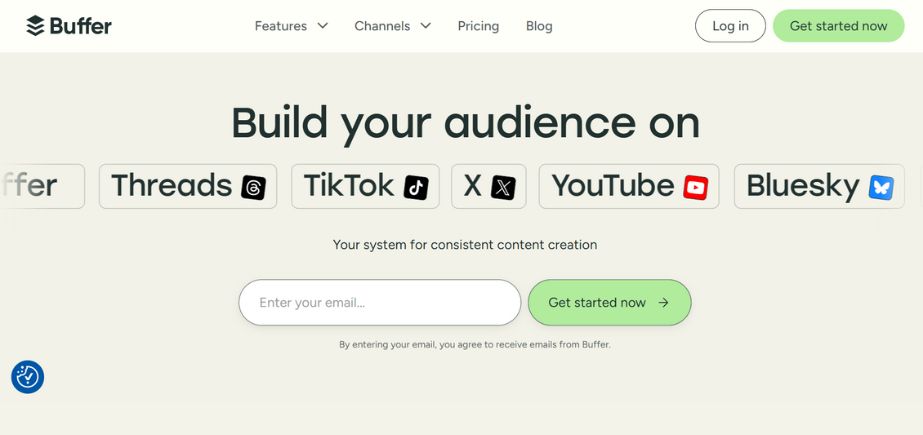
The user-friendly platform Buffer Analyze helps businesses track their social media engagement, together with audience growth and post results across different platforms. You can obtain comprehensive insights about what Kourellofpay should post and when based on audience information and engagement performance data.
Users possess the ability to generate customized reports, which help them track content strategy effectiveness. Buffer Analyze enables users to integrate their accounts through Instagram as well as Facebook, along with Twitter and LinkedIn platforms. Maximal functionality becomes accessible through its basic layout, making Buffer Analyze beneficial for market and small company social media analytics needs.
Key Features:
- Post and campaign performance tracking.
- Audience demographics and engagement insights.
- Customizable reports.
- Best posting time recommendations.
Pros:
- Affordable for small businesses.
- Simple and user-friendly interface.
Cons:
- Limited in-depth analytics.
- No competitor benchmarking features.
Pricing: Starts at $6/month.
Who Should Use It?
Small businesses and startups are looking for basic social media insights.
4. Tagembed – Social Media Aggregator
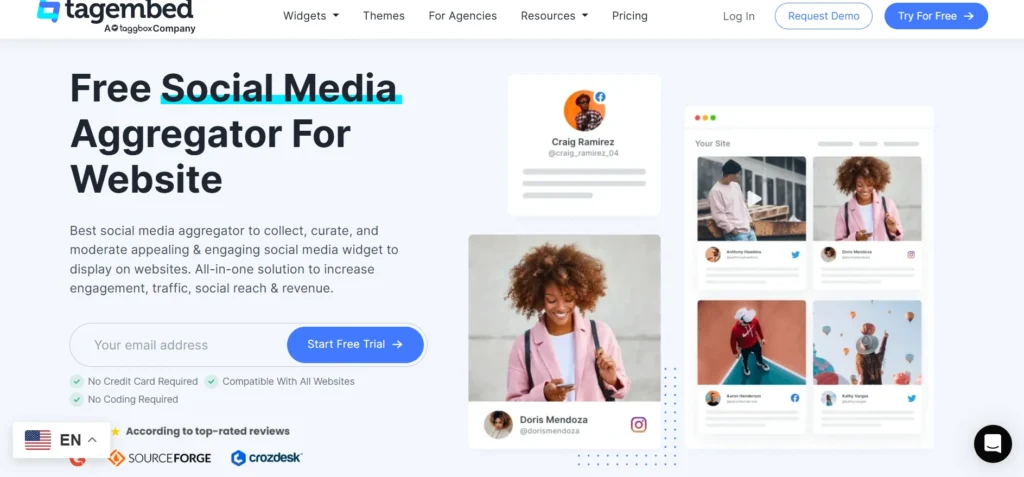
Tagembed is a user-friendly social media aggregator and widget platform that helps businesses collect and display social media content and reviews on their websites. It lets you pull posts, videos, and testimonials from multiple platforms into a single, branded social media widget that you can embed without any coding. With Tagembed, businesses can showcase live social proof, campaign hashtags, add google reviews, and even use a google review widget to build trust and boost engagement on key landing pages.
Users can customize feed layouts, apply moderation to filter unwanted posts, and track basic performance metrics to understand how embedded content is performing. Tagembed supports integration with platforms like Instagram, Facebook, X (Twitter), YouTube, and more, making it a flexible option for brands that want to centralize their user-generated content. Its simple interface and plug-and-play embed options make it practical for marketers and small businesses who want to enhance their site with social content quickly.
Key Features:
- Collects and aggregates content from multiple social media platforms.
- Customizable layouts and themes for social media widgets.
- Basic analytics for impressions and engagement.
- Content moderation and filtering options.
Pros:
- Easy, no-code embedding for websites and stores.
- Supports multiple platforms and content formats.
Cons:
- Limited advanced analytics compared to dedicated analytics tools.
- Not focused on deep competitor analysis.
Pricing: Starts from $19
Who Should Use It?
Small businesses, marketers, and agencies that want to display social media and review content on their website, increase trust with embedded social proof, and need a simple, customizable social media widget solution.
5. Brandwatch

Brandwatch is a sophisticated AI-powered social listening and analytics tool enabling brands to track conversations on the web and social media. Brandwatch measures mentions, sentiment, and engagement on the web and social media. Brandwatch delivers real-time insights, enabling businesses to track trends, competition, and audience behaviors.
Brandwatch AI-enabled features enable users to forecast trends in the future and detect influential key personas. With powerful data visualization capabilities and advanced sentiment analysis, Brandwatch is best suited for organizations that require data-driven marketing choices and improved online brand image.
Key Features:
- Sentiment analysis and AI-driven insights.
- Competitive benchmarking.
- Audience segmentation and influencer tracking.
- Custom dashboards with real-time data.
Pros:
- Excellent for in-depth brand monitoring.
- Advanced AI-powered data analysis.
Cons:
- High learning curve.
- Expensive for small businesses.
Pricing: Custom pricing.
Who Should Use It?
Businesses and brands want competitive information and in-depth social listening.
Suggested read: SaaS Analytics Tools
6. Taggbox – UGC Platform
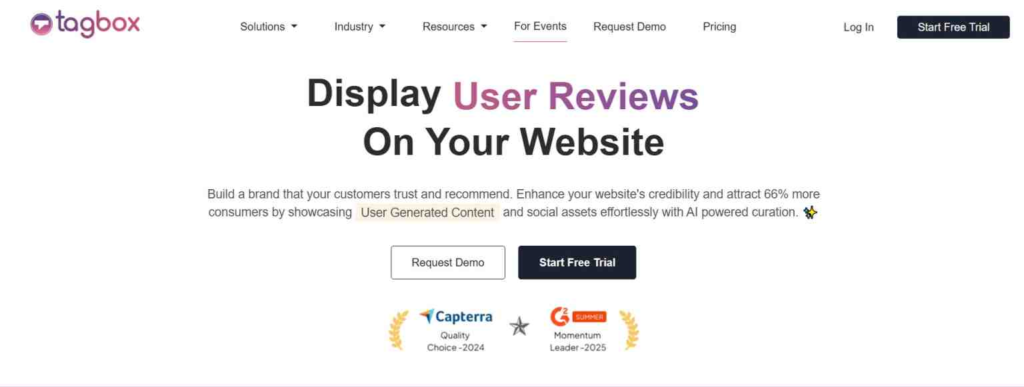
Taggbox is a user-friendly UGC and social media aggregation platform that helps businesses collect, curate, and display social media content, customer reviews, and user-generated posts across websites, campaigns, and digital screens. It enables brands to pull content from multiple platforms into visually engaging widgets and social walls that can be embedded without any coding. With Taggbox, you can showcase real customer experiences, event highlights, product tags, and even embed YouTube channel content to create dynamic, interactive experiences that boost trust and engagement.
Users can access valuable insights on how their embedded content performs, including views, clicks, and interactions, helping them understand what type of social proof and content resonates best with their audience. Taggbox supports integrations with platforms like Instagram, Facebook, X (Twitter), YouTube, TikTok, and Google Reviews, making it a versatile solution for brands that want to centralize their social presence. Its clean interface and guided setup make it suitable for marketers, agencies, and small businesses that want to enhance their website with rich social and review content quickly.
Key Features:
- Aggregates and curates content from multiple social and review platforms.
- Customizable social walls and widgets to match brand design.
- Analytics for impressions, clicks, and engagement on embedded content.
- Moderation tools to filter and approve posts before display.
Pros:
- Easy, no-code embedding for websites, screens, and campaigns.
- Strong focus on UGC, reviews, and visual storytelling.
Cons:
- Analytics are more content-performance focused than full-funnel.
- Not designed for deep competitor or cross-channel ad analytics.
Pricing:
Starts from $19
Who Should Use It?
Brands, marketers, and agencies that want to showcase user-generated content, reviews, and social feeds on their website or screens, build stronger social proof, and create engaging experiences by bringing their community and YouTube content directly into their digital touchpoints.
7. Socialbakers (Emplifi)
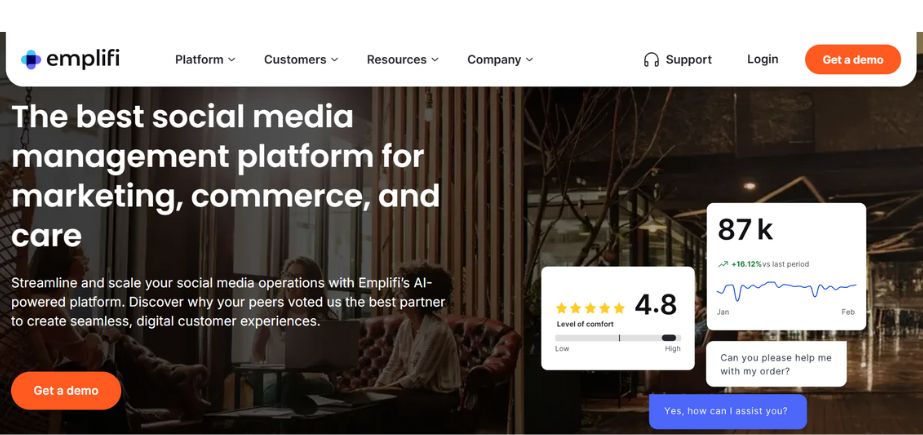
Socialbakers operates as an Emplifi subsidiary delivering AI-based social media analytics through which businesses gain audience analytics and competitive analytics. The platform allows companies to discover demographic data about their followers while revealing their engagement behaviors and content that appeals to them. Socialbakers has features for performance benchmarking as well as automatic reporting, together with influencer research capabilities.
Socialbakers includes AI-based content strategy enhancement suggestions among its capabilities. Through its platform flexibility, Socialbakers provides benefits to businesses with extensive social media activities. Socialbakers presents businesses with an excellent solution for maximizing social media engagement due to its precise analytics, together with AI-based intelligence capabilities.
Key Features:
- AI-powered social media analytics.
- Competitor and influencer tracking.
- Content performance insights.
- Automated reporting.
Pros:
- Strong audience segmentation capabilities.
- Good for influencer tracking.
Cons:
- It can be complex for beginners.
- Expensive compared to some alternatives.
Pricing: Custom pricing.
Who Should Use It?
Large enterprises and marketing agencies.
8. Quintly
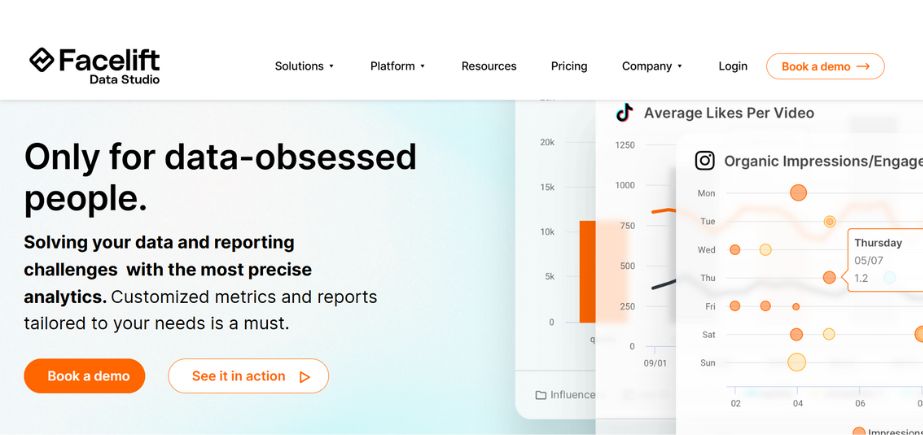
Quintly is an interactive social media analysis tool through which companies can track performance across several sites. It provides detailed reports about engagement, acquiring followers, and comparing them to the competition. Custom dashboards and auto-reporting scheduled reporting can be done by the users.
It is compatible with YouTube, TikTok, Facebook, Instagram, Twitter, and LinkedIn. It offers API access to provide in-depth analysis of data and thus is well-suited for enterprise and agency users. With high-tech visualizations and custom measurements, Quintly helps brands foster data-driven choices to maximize social media strategy.
Key Features:
- Custom dashboard creation.
- Cross-platform analytics.
- Automated reporting.
- Competitor benchmarking.
Pros:
- Highly customizable reports.
- Supports multiple social platforms.
Cons:
- Not beginner-friendly.
- Expensive for smaller teams.
Pricing: on request.
Who Should Use It?
Data-driven marketers and agencies need advanced reporting.
Suggested read: Business Analysis Tools
9. Keyhole

Keyhole is a robust social media monitoring and analytics tool with an emphasis on hashtags, mentions, and influencer monitoring. It offers real-time insights into what people are talking about, the performance of campaigns, and the mood of the audience. Keyhole’s predictions based on AI assist companies in refining their social media strategy.
Keyhole is used extensively for tracking brand mentions and influencer marketing campaign tracking. The intuitive dashboard of Keyhole suits small as well as large companies. With automated competitor and reporting features, Keyhole assists brands in taking their social media engagement to the next level.
Key Features:
- Hashtag and keyword tracking.
- Real-time social listening.
- Influencer analytics.
- Campaign performance measurement.
Pros:
- Excellent for campaign tracking.
- Real-time data insights.
Cons:
- Limited integrations.
- It can be expensive for small businesses.
Pricing: on request.
Who Should Use It?
Brands are running hashtag campaigns and influencer marketing.
10. Talkwalker

Talkwalker provides brands with a platform that monitors social conversation and sentiment analysis across the internet through its analytics and listening platform. The platform continuously monitors social media content as well as blogs, news websites, and discussion forums to reveal detailed audience emotions to businesses.
By using Talkwalker’s sentiment analysis based on artificial intelligence, companies develop expertise in tracking customer sentiment alongside emerging market trends. An additional capability includes market competitor analysis and detecting influential individuals. Talkwalker supports global brands through multi-language options as well as image recognition technology, which helps them acquire extensive social media insights for managing their reputation.
Key Features:
- AI-powered sentiment analysis.
- Competitive benchmarking.
- Crisis monitoring and trend tracking.
- Customizable dashboards.
Pros:
- Advanced social listening capabilities.
- Comprehensive reporting.
Cons:
- Expensive for small businesses.
- Requires some technical expertise.
Pricing: Custom pricing.
Who Should Use It?
Big agencies and brands want in-depth social insights.
Suggested read: Facebook Ads Tools
11. BuzzSumo
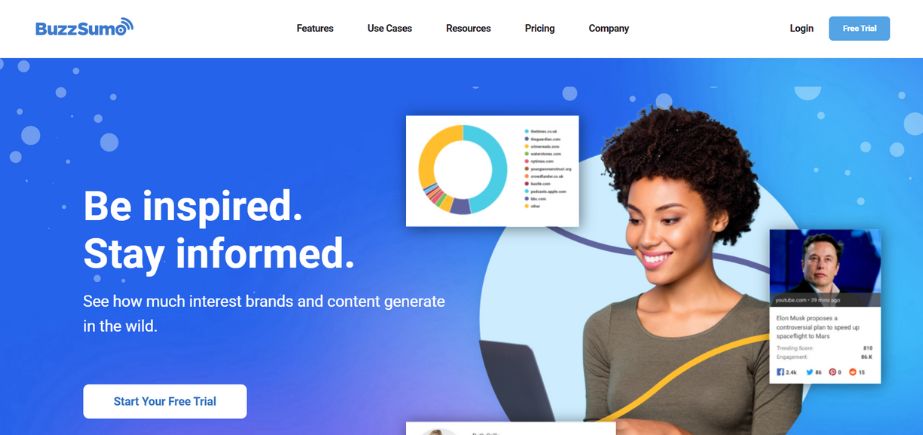
The content analysis platform BuzzSumo provides businesses with data about significant topics and social monitoring metrics. BuzzSumo provides businesses a way to measure their social media share performance, together with backlinks and influential power, to determine their most effective content strategies. BuzzSumo enables users to check competitor content performance alongside the most popular keywords in their industry.
Brand monitoring through social listening features forms a part of BuzzSumo’s offering, which lets companies check mentions and get sentiment data. Businesses extensively use BuzzSumo to plan their social media content along with their content marketing strategy. Organizations seeking optimal content engagement must embrace BuzzSumo as a tool because it provides deep analysis combined with competitor evaluation.
Key Features:
- Content discovery and analysis.
- Competitor content tracking.
- Influencer identification.
- Engagement and backlink tracking.
Pros:
- Great for content marketing.
- Helps find trending topics quickly.
Cons:
- Limited social media analytics.
- Higher-tier plans can be expensive.
Pricing: Starts at $99/month.
Who Should Use It?
Content marketers and social media strategists.
12. Iconosquare
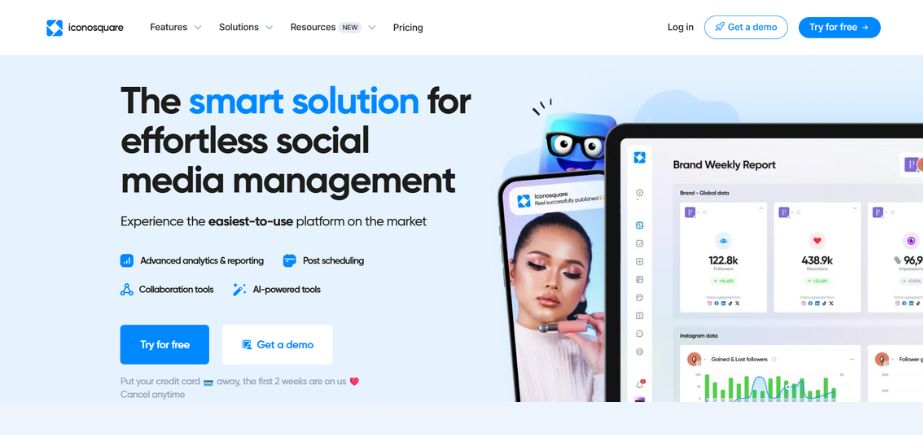
Iconosquare is a social media analytics tool with an Instagram and Facebook focus. It provides in-depth insights into followers, engagement, and post-performance. It allows users to track hashtags, track the performance of competitors, and schedule posts. Iconosquare’s auto-reporting functionality enables companies to simply measure the ROI of social media.
The tool also provides recommendations for the optimal times to post to reach the largest audience. With its simplicity and rich analysis, Iconosquare is an extremely helpful utility for visual content marketers and influencers, as well as brands.
Key Features:
- In-depth Instagram, Facebook, and LinkedIn analytics.
- Content performance tracking.
- Competitor benchmarking.
- Automated reports and scheduling.
Pros:
- Best for Instagram analytics.
- User-friendly interface.
Cons:
- Limited to select platforms (no Twitter or YouTube support).
- More suitable for brands than individuals.
Pricing: Starts at $39/month.
Who Should Use It?
Social media managers and influencers focus on Instagram and Facebook.
13. Rival IQ
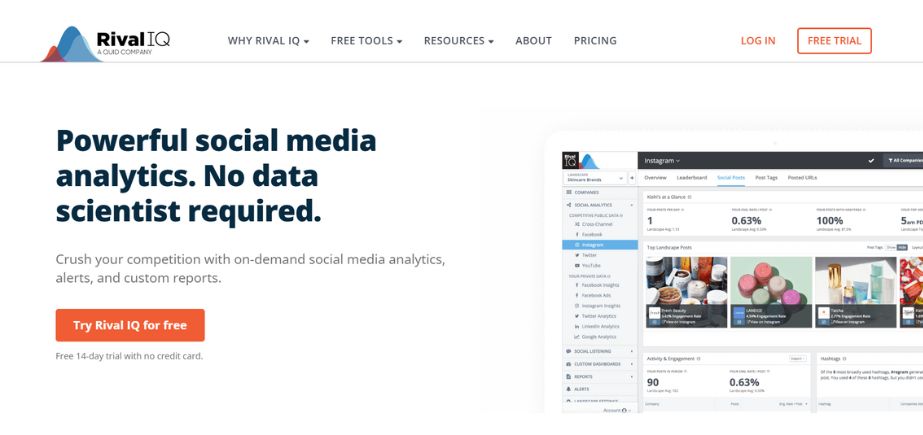
Rival IQ is a competitive social media analytics tool that gives companies the ability to assess how well they are performing on social media in comparison to their competitors. The platform makes available information for audience growth overall, presentation outcomes, and user interactions with content. Facebook, along with Instagram, Twitter, LinkedIn, and YouTube, are all included in Rival IQ’s tracking capabilities.
Brands utilize Rival IQ automated reporting along with AI suggestions, which help them find the best social media optimization strategy. The monitoring process includes tracking terms through hashtags and keywords to discover popular trends. Rival IQ serves companies perfectly that want to dominate their market through competitive benchmarking capabilities.
Key Features:
- Competitive benchmarking.
- Hashtag and trend analysis.
- Engagement tracking.
- Custom alerts for performance changes.
Pros:
- Strong competitor tracking.
- Detailed social media performance insights.
Cons:
- Limited automation features.
- It can be expensive for small businesses.
Pricing: Starts at $239/month.
Who Should Use It?
Businesses want to track competitors’ social media strategies.
14. Agorapulse
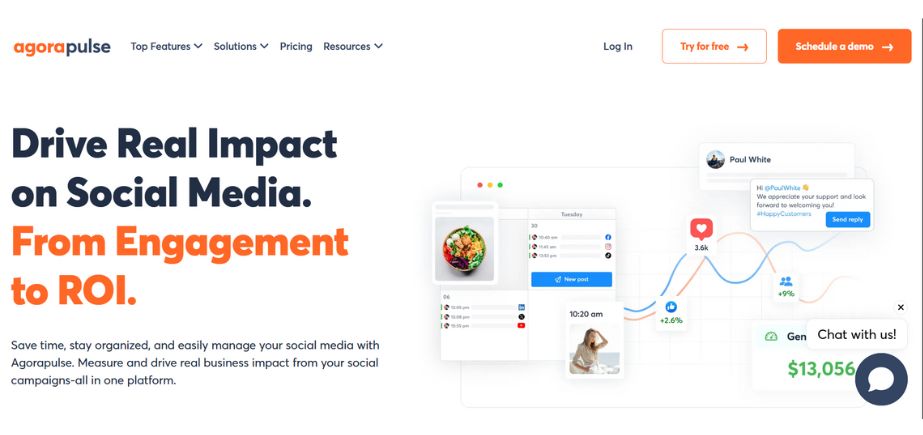
Agorapulse is a social media analytics and management platform that gives insights into engagement, reach, and audience growth. It has an easy-to-use dashboard, auto-reporting, as well as competitor and analysis tools.
Agorapulse’s social inbox gathers messages from various platforms to easily manage the community. It also has scheduling and content calendar capabilities. With its in-depth analytics and ease of use, Agorapulse is perfect for agencies and businesses that want to advance social media engagement and efficiency.
Key Features:
- Engagement and audience analytics.
- Automated social media reporting.
- Unified inbox for social interactions.
- Competitor analysis and benchmarking.
Pros:
- Strong collaboration features.
- Easy-to-understand analytics dashboard.
Cons:
- Limited integrations with third-party tools.
- Lacks advanced sentiment analysis.
Pricing: Starts at $79/month.
Who Should Use It?
Small to mid-sized businesses and agencies managing multiple social accounts.
15. Google Analytics (for social media tracking)

Google Analytics serves as a powerful tool that allows users to monitor social media traffic to their sites. This tool allows companies to view how their social media campaigns influence web traffic and both user conversions and certain actions. Google Analytics provides website owners with information regarding how customers access their pages and what proportion of users exit immediately after landing on their websites, as well as statistical data regarding visitors’ traits.
Using this tool, users are able to set personal goals and identify the value achieved from their social media investment. Business organizations rely on this combined tool for social media effectiveness to generate web traffic and sales due to the fact that Google Analytics supports various platforms.
Key Features:
- Social media referral tracking.
- Conversion tracking from social campaigns.
- Audience behavior analysis.
- Customizable dashboards.
Pros:
- Free to use.
- Powerful website tracking with social media insights.
Cons:
- Requires manual setup for detailed social tracking.
- No direct social media engagement analytics.
Pricing: Free (Google Analytics 4); Premium version available for enterprises.
Who Should Use It?
Website owners and digital marketers are tracking social media-driven traffic.
16. Sprinklr

Sprinklr is a social media management and analytics platform for enterprises. It offers artificial intelligence-based audience engagement, sentiment analysis, and competitor performance insights. Sprinklr is equipped to handle several social media sites and has powerful automation capabilities.
The platform allows brands to monitor conversations online, track mentions, and gauge campaign performance. Thanks to its AI-powered recommendations and in-depth analytics, Sprinklr is among the best suited for large companies that have multi-channel, complex social media strategies to execute.
Key Features:
- AI-driven social listening.
- Customer sentiment analysis.
- Real-time social media performance tracking.
- Advanced automation and reporting.
Pros:
- Ideal for large-scale brands.
- Extensive integrations with CRM and customer service tools.
Cons:
- High cost.
- It can be complex to set up and use.
Pricing: Custom pricing.
Who Should Use It?
Large enterprises and corporations manage global social media operations.
17. Mention
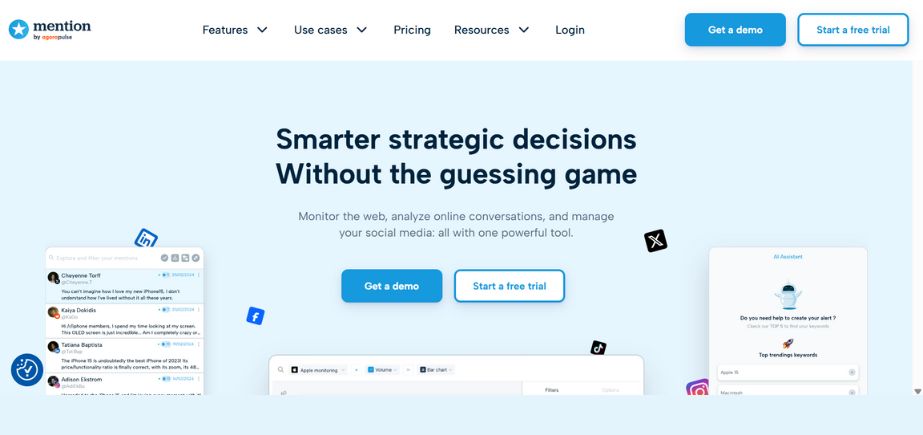
Mention is an analytics and monitoring platform for social media that allows companies to track brand mentions, hashtags, and sentiment. Mention monitors blogs, social media, and news sites in real time and gives insights into the perception of the audience. Mention’s analytics offers the user the facility to measure engagement, track influencers, and compare the performance of a brand with others.
Mention’s sentiment analysis, powered by AI, allows brands to gain deeper insights into customer feedback. With its report customization and real-time notifications, Mention is best for businesses that seek to increase brand reputation and social media engagement.
Key Features:
- Real-time brand and competitor monitoring.
- Sentiment analysis and trend tracking.
- Custom reports and automated alerts.
- Influencer tracking.
Pros:
- Great for monitoring brand reputation.
- User-friendly interface with real-time alerts.
Cons:
- Limited historical data access in lower-tier plansIt can become costly with more users or features.
Pricing: Starts at $41/month.
Who Should Use It?
Brands and PR teams are monitoring online reputation and conversations.
Comparison Between Different Social Media Analytics Tools
Here’s a comparison table for the 15 social media analytics tools, covering features, pricing, use cases, and websites.
| Tool | Key Features | Pricing | Best For | Website |
| Hootsuite Analytics | Performance tracking, scheduling, reporting, and AI insights | Starts at ₹1,915per month | Businesses, agencies, enterprises | hootsuite.com |
| Sprout Social | AI-driven analytics, engagement metrics, and CRM integration | Starts at $249/month | Brands, agencies, enterprises | sproutsocial.com |
| Buffer Analyze | Engagement tracking, post-performance insights, reports | Starts at $6/month | Small businesses, marketers | buffer.com |
| Brandwatch | Social listening, sentiment analysis, competitor tracking | Custom pricing | Large enterprises, market research | brandwatch.com |
| Socialbakers (Emplifi) | AI-driven insights, competitive analysis, and audience segmentation | Custom pricing | Brands, agencies, influencers | emplifi.io |
| Quintly | Custom dashboards, competitor benchmarking, and automation | On request | Agencies, data-driven marketers | quintly.com |
| Keyhole | Hashtag tracking, influencer analytics, and real-time monitoring | On request | Influencers, brands, and event marketing | keyhole.co |
| Talkwalker | Social listening, sentiment analysis, and AI-driven insights | Custom pricing | Large enterprises, media monitoring | talkwalker.com |
| BuzzSumo | Content analytics, competitor tracking, engagement insights | Starts at $199/month | Content marketers, SEO specialists | buzzsumo.com |
| Iconosquare | Instagram & Facebook analytics, scheduling, benchmarking | Starts at $39/month | Social media managers, brands | iconosquare.com |
| Rival IQ | Competitive analysis, post-performance tracking, and alerts | Starts at $239/month | Agencies, social media teams | rivaliq.com |
| Agorapulse | Engagement tracking, automated reports, and scheduling | Starts at $79/month | Businesses, agencies, and social teams | agorapulse.com |
| Google Analytics (for social tracking) | Social traffic analysis, referral tracking, and behavior reports | Free | Website owners, digital marketers | marketingplatform.google.com/about/analytics/ |
| Sprinklr | AI-powered analytics, omnichannel insights, and automation | Custom pricing | Large enterprises, global brands | sprinklr.com |
| Mention | Brand monitoring, sentiment analysis, and real-time alerts | Starts at $41/month | PR teams, brand managers, agencies | mention.com |
Conclusion
Social media analytics tools are essential for businesses, marketers, and content producers looking to track performance, quantify audience engagement, and refine strategy. Each of these tools satisfies different requirements through its features, cost, and audience.
Companies that need a full-fledged solution can consider Sprout Social and Hootsuite Analytics for extensive reporting, automation, and cross-platform capabilities. Brandwatch and Talkwalker are optimal for businesses needing advanced AI-powered social listening and sentiment analysis.
BuzzSumo excels in monitoring content performance, so content marketers will like it best. Iconosquare is the go-to tool for Instagram and Facebook analytics. Omnisend and Drip, which provide high-level customer segmentation and omnichannel marketing capabilities, can be used by e-commerce businesses.
For businesses and startups, Google Analytics (social tracking), Agorapulse, and Buffer Analyze are budget-friendly but high-powered. Real-time mention brand is optimally handled with Mention, and Rival IQ handles competitive benchmarking ideally. Quintly and Sprinklr could be useful for agencies with lots of clients requiring tailored reporting and massive-level data analysis.
Lastly, the appropriate tool depends on business size, budget, and desired outcome. Small firms and solo operators will need low-cost, easy-to-use platforms, whereas enterprises and agencies will need tools offering detailed analytics, automation, and AI-powered insights.
FAQs
1. What are social media analytics tools?
Businesses may monitor, assess, and evaluate their social media performance with the use of social media analytics tools. They provide engagement, demographic, content performance, and competitor analysis insights to help inform marketing strategy.
2. Why is social media analytics software important?
These tools allow businesses to track audience behavior, track key performance metrics, measure campaign performance, and refine content strategy. They further facilitate sentiment analysis, influencer monitoring, and competitor benchmarking.
3. Who uses social media analytics software?
These tools can be used by marketers, businesses, content creators, agencies, and social media managers to track performance, maximize engagement, and make decisions.
4. What should I look for in a social media analytics tool?
Real-time monitoring, engagement rate, audience data, competitive benchmarking, sentiment analysis, auto-reporting, and support for social media channels are most important.
5. What is the best social media analytics tool for small businesses?
Hootsuite Analytics, Buffer Analyze, and Iconosquare are best suited for small businesses due to ease of use, affordability, and provision of required analytics features.
6. What is the best competitor research tool?
Rival IQ and Socialbakers (Emplifi) provide competitor comparison and benchmarking across the board in the industry in performance.
